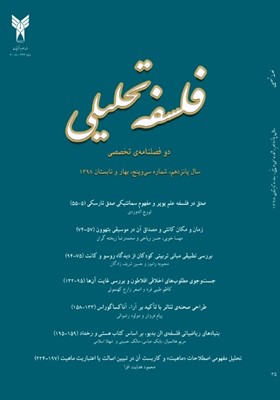بررسی تطبیقی مبانی تربیتی کودکان از دیدگاه روسو و کانت
محورهای موضوعی : فلسفه
کلید واژه: آزادی, اصول, تربیت, روسو, کانت,
چکیده مقاله :
هدف از این مقاله بررسی مبانی تربیتی کودکان از دیدگاه روسو و کانت در دو بخش اهداف و اصول به صورت تطبیقی است. روش مورد استفاده در این مقاله رویکرد تحلیلی است. از نظر روسو هدف تربیت هماهنگی و انطباق با طبیعت است و کانت مهمترین هدف را تحقق تربیت اخلاقی از راه انضباط میداند. اصول مشترک شامل تدریجی بودن تربیت، مخالفت با تنبیه بدنی و در نظر گرفتن مجازات به شکل مشاهده نتیجه عمل است. روسو اعتقاد به آزادی در کودکی و تربیت برای زمان حال و پیروی از طبیعت دارد. در نقد این دیدگاه میتوان بی توجهی به آموزش متناسب با رشد کودکان تا سن 12سالگی و دیدگاه منفی نسبت به جامعه و فاسد دانستن آن را مطرح کرد. درمقابل کانت اعتقاد به حرکت از انضباط به سوی آزادی، توجه به زمان آینده و تشکیل عادات مطلوب از راه اطاعت از بزرگسالان دارد. در نقد دیدگاه وی میتوان نادیده گرفتن فعالیت آزاد در کودکی را مطرح کرد. در نتیجه در بزرگسالی فرد ناتوان در تصمیمگیری و کسب استقلال خواهد بود و دلیل آن روحیه مطیع بودن در کودکی میباشد. بنابراین نوعی دیدگاه افراطی در آزادی از نظر روسو و انضباط از نظر کانت وجود دارد.
The purpose of this paper is to examine the educational principles of children from the perspective of Rousseau and Kant in two comparative purposes and principles. For Rousseau, the goal is to cultivate harmony with nature, and Kant considers the most important goal to be the discipline of moral education. Common principles include the gradual upbringing, opposition to corporal punishment, and the consideration of punishment as a result of observation. Rousseau believes in the freedom of childhood and education for the present and the pursuit of nature. Criticizing this view can be the neglect of education appropriate to the development of children up to the age of 12 and the negative view of society and its pervasiveness. Kant, on the other hand, believes in moving from discipline to freedom, attention to the future, and the formation of good habits through obedience to adults. Criticizing his point of view can be the neglect of free activity in children. As a result, in adulthood one will be unable to make decisions and gain independence because of the spirit of obedience in childhood. So there is a radical view of freedom in Rousseau's terms and in Kant's discipline.
_||_

